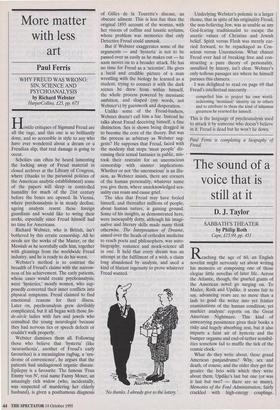More matter with less art
Paul Ferris
WHY FREUD WAS WRONG: SIN, SCIENCE AND PSYCHOANALYSIS by Richard Webster HarperCollins, £25, pp. 673 Hostile critiques of Sigmund Freud are all the rage, and this one is so brilliantly done, and so accessible in style to any who have ever wondered about a dream or a Freudian slip, that real damage is going to occur.
Scholars can often be heard lamenting the locking away of Freud material in closed archives at the Library of Congress, where (thanks to the paranoid policies of the American analytic establishment) some of the papers will sleep in controlled humidity for much of the 21st century before the boxes are opened. In Vienna, where psychoanalysis is in steady decline, ageing analysts resent these foreign guardians and would like to wring their necks, especially since Freud himself had no time for Americans.
Richard Webster, who is British, isn't bothered by this erratic censorship. All he needs are the works of the Master, or the Messiah as he scornfully calls him, together with gleanings from the worldwide Freud industry, and he is ready to do his worst.
Webster's method is to contrast the breadth of Freud's claims with the narrow- ness of his achievement. The early patients, whose cases would create psychoanalysis, were 'hysterics,' mostly women, who sup- posedly converted their inner conflicts into physical symptoms. Freud claimed to find emotional reasons for their illness. Later on, psychoanalysis grew devilishly complicated, but it all began with those fin- de-siecle ladies with furs and jewels who consulted the young neurologist because they had nervous tics or speech defects or couldn't walk properly.
Webster dismisses them all. Following those who believe that 'hysteria' (like `neurasthenia', another of Freud's early favourites) is a meaningless ragbag, a 'syn- drome of convenience', he argues that the patients had undiagnosed organic disease. Epilepsy is a favourite. The famous 'Frau Emmy von N', real name Fanny Moser, an amazingly rich widow (who, incidentally, was suspected of murdering her elderly husband), is given a posthumous diagnosis of Gilles de la Tourette's disease, an obscure ailment. This is less fun than the original 1895 account of the woman, with her visions of coffins and lunatic asylums, whose problem was memories that only Detective Freud could unmask.
But if Webster exaggerates some of the arguments — and 'hysteria' is not to be passed over as easily as he makes out — he soon moves on to a broader attack. He has no time for Freud as a 'scientist'. He gives a lucid and credible picture of a man wrestling with the biology he learned as a student, trying to connect it with the dark scenes he drew from within himself, the whole process powered by messianic ambition, and shaped (my words, not Webster's) by guesswork and desperation.
Unlike some of the Freud-bashers, Webster doesn't call him a liar. Instead he talks about Freud deceiving himself, a fine distinction. Sex is shown being dragged in to become the core of the theory. But was the process as arbitrary as Webster sug- gests? He supposes that Freud, faced with the modesty that stops 'most people' dis- cussing their sexual fantasies in public, mis- • took their restraint for an unconscious censorship with sinister implications. Whether or not 'the unconscious' is an illu- sion, as Webster insists, there are corners of the human personality, whatever name you give them, where unacknowledged sex- uality can roam and cause grief.
The idea that Freud may have fooled himself, and thereafter millions of people, about human nature, is gaining ground. Some of his insights, as demonstrated here, were inescapably dotty, although his imagi- native and literary skills made many think otherwise. The Interpretation of Dreams, aimed over the heads of orthodox medicine to reach poets and philosophers, was auto- biography, romance and mock-science all in one. It held that every dream was an attempt at the fulfilment of a wish, a claim long abandoned by analysis, and used a kind of blatant ingenuity to prove whatever Freud wanted.
No thanks. I already give to the lottery.' Underlying Webster's polemic is a larger theme, that in spite of his originality Freud, the non-believing Jew, was as unable as any God-fearing traditionalist to escape the ascetic values of Christian and Jewish belief. Spirit versus Flesh was merely car- ried forward, to be repackaged as Con- scious versus Unconscious. What chance Freud ever had of breaking free and con- structing a pure theory of personality, unsullied by history, isn't clear. Webster's only tedious passages are where he himself pursues this chimera.
I was delighted to read on page 69 that Freud's intellectual insecurity
compelled him to project his own world- redeeming 'messianic' identity on to others and to attribute to them the kind of inhuman greatness he yearned for himself.
This is the language of psychoanalysis used to attack it by someone who doesn't believe in it. Freud is dead but he won't lie down.
Paul Ferris is completing a biography of Freud.










































































 Previous page
Previous page